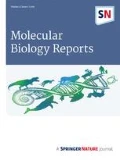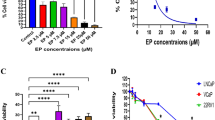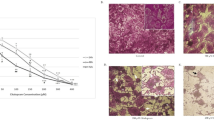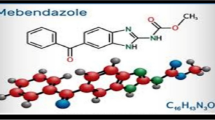Abstract
The present study has investigated the anti-tumor activity and the underlying mechanisms of matrine on human colon cancer LoVo cells. Matrine inhibited the proliferation of the cells in dose- and time-dependent manners. The concentration required for 50 % inhibition (IC50) was 1.15, 0.738, and 0.414 mg/ml, when cell were incubated with matrine for 24, 48, and 72 h, respectively. Matrine induced cell cycle arrest at G1 phase by downregulating cyclin D1 and upregulating p27 and p21. Matrine induced cell apoptosis by reducing the ratio of Bcl-2/Bax and increasing the activation of caspase-9 in a dose-dependent manner. Matrine displayed its anti-tumor activity by inactivating Akt, the upstream factor of the above proteins. Matrine significantly reduced the protein levels of pAkt, and increased the protein levels of other downstream factors, pBad and pGSK-3β. Specific inhibition of pAkt induced cell apoptosis, and synergized with matrine to inhibit the proliferation of LoVo cells; whereas activation of Akt neutralized the inhibitory effect of matrine on cell proliferation. The present study has demonstrated that matrine inhibits proliferation and induces apoptosis of human colon cancer LoVo cells by inactivating Akt pathway, indicating matrine may be a potential anti-cancer agent for colon cancer.




Similar content being viewed by others
References
Zhang S, Zhang Y, Zhuang Y, Wang J, Ye J, Zhang S, Wu J, Yu K, Han Y (2012) Matrine induces apoptosis in human acute myeloid leukemia cells via the mitochondrial pathway and Akt inactivation. PLoS One 7:e46853
Long Y, Lin XT, Zeng KL, Zhang L (2004) Efficacy of intramuscular matrine in the treatment of chronic hepatitis B. Hepatobiliary Pancreat Dis Int 3:69–72
Zhang JP, Zhang M, Zhou JP, Liu FT, Zhou B, Xie WF, Guo C (2001) Antifibrotic effects of matrine on in vitro and in vivo models of liver fibrosis in rats. Acta Pharmacol Sin 22:183–186
Liu JY, Hu JH, Zhu QG, Li FQ, Wang J, Sun HJ (2007) Effect of matrine on the expression of substance P receptor and inflammatory cytokines production in human skin keratinocytes and fibroblasts. Int Immunopharmacol 7:816–823
Li X, Chu W, Liu J, Xue X, Lu Y, Shan H, Yang B (2009) Antiarrhythmic properties of long-term treatment with matrine in arrhythmic rat induced by coronary ligation. Biol Pharm Bull 32:1521–1526
Zhang L, Wang T, Wen X, Wei Y, Peng X, Li H, Wei L (2007) Effect of matrine on HeLa cell adhesion and migration. Eur J Pharmacol 563:69–76
Liu XS, Jiang J, Jiao XY, Wu YE, Lin JH (2006) Matrine-induced apoptosis in leukemia U937 cells: involvement of caspases activation and MAPK-independent pathways. Planta Med 72:501–506
Liu XS, Jiang J (2006) Molecular mechanism of matrine- induced apoptosis in leukemia K562 Cells. Am J Chin Med 34:1095–1103
Jiang H, Hou C, Zhang S, Xie H, Zhou W, Jin Q, Cheng X, Qian R, Zhang X (2007) Matrine upregulates the cell cycle protein E2F-1 and triggers apoptosis via the mitochondrial pathway in K562 cells. Eur J Pharmacol 559:98–108
Luo C, Zhu Y, Jiang T, Lu X, Zhang W, Jing Q, Li J, Pang L, Chen K, Qiu F, Yu X, Yang J, Huang J (2007) Matrine induced gastric cancer MKN45 cells apoptosis via increasing pro-apoptotic molecules of Bcl-2 family. Toxicology 229:245–252
Dai ZJ, Gao J, Ji ZZ, Wang XJ, Ren HT, Liu XX, Wu WY, Kang HF, Guang H (2009) Matrine induces apoptosis in gastric carcinoma cells via alteration of Fas/FasL and activation of caspase-3. J Ethnopharmacol 123:91–96
Luo C, Zhong HJ, Zhu LM, Wu XG, Ying JE, Wang XH, Lü WX, Xu Q, Zhu YL, Huang J (2012) Inhibition of matrine against gastric cancer cell line MNK45 growth and its anti-tumor mechanism. Mol Biol Rep 39:5459–5464
Zhang Y, Zhang H, Yu P, Liu Q, Liu K, Duan H, Luan G, Yagasaki K, Zhang G (2009) Effects of matrine against the growth of human lung cancer and hepatoma cells as well as lung cancer cell migration. Cytotechnology 59:191–200
Yu P, Liu Q, Liu K, Yagasaki K, Wu E, Zhang G (2009) Matrine suppresses breast cancer cell proliferation and invasion via VEGF-Akt-NF-kappaB signaling. Cytotechnology 59:219–229
Li LQ, Li XL, Wang L, Du WJ, Guo R, Liang HH, Liu X, Liang DS, Lu YJ, Shan HL, Jiang HC (2012) Matrine Inhibits Breast Cancer Growth Via miR-21/PTEN/Akt Pathway in MCF-7 Cells. Cell Physiol Biochem 30:631–641
Yu P, Liu Q, Liu K, Yagasaki K, Wu E (2009) Matrine suppresses breast cancer cell proliferation and invasion via VEGF-Akt-NF-kappaB signaling. Cytotechnology 59:219–229
Liu XY, Fang H, Yang ZG, Wang XY, Ruan LM, Fang DR, Ding YG, Wang YN, Zhang Y, Jiang XL, Chen HC (2008) Matrine inhibits invasiveness and metastasis of human malignant melanoma cell line A375 in vitro. Int J Dermatol 47:448–456
Zhang Z, Wang X, Wu W, Wang J, Wang Y, Wu X, Fei X, Li S, Zhang J, Dong P, Gu J, Liu Y (2012) Effects of matrine on proliferation and apoptosis in gallbladder carcinoma cells (GBC-SD). Phytother Res 26:932–937
Zhang P, Wang Z, Chong T, Ji Z (2012) Matrine inhibits proliferation and induces apoptosis of the androgen-independent prostate cancer cell line PC-3. Mol Med Rep 5:783–787
Liang CZ, Zhang JK, Shi Z, Liu B, Shen CQ, Tao HM (2012) Matrine induces caspase-dependent apoptosis in human osteosarcoma cells in vitro and in vivo through the upregulation of Bax and Fas/FasL and downregulation of Bcl-2. Cancer Chemother Pharmacol 69:317–331
Ma L, Wen S, Zhan Y, He Y, Liu X, Jiang J (2008) Anticancer effects of the Chinese medicine matrine on murine hepatocellular carcinoma cells. Planta Med 74:245–251
Zhang S, Qi J, Sun L, Cheng B, Pan S, Zhou M, Sun X (2009) Matrine induces programmed cell death and regulates expression of relevant genes based on PCR array analysis in C6 glioma cells. Mol Biol Rep 35:421–429
Li H, Tan G, Jiang X, Qiao H, Pan S, Jiang H, Kanwar JR, Sun X (2010) Matrine inhibits growth of primary and metastatic breast cancer in mice. Am J Chin Med 38:1115–1130
Liu T, Song Y, Chen H, Pan S, Sun X (2010) Matrine inhibits proliferation and induces apoptosis of pancreatic cancer cells in vitro and in vivo. Biol Pharm Bull 33:1740–1745
Jemal A, Bray F, Center MM, Ferlay J, Ward E, Forman D (2011) Global cancer statistics. CA Cancer J Clin 61:69–90
He C, Sun XP, Qiao H, Jiang X, Wang D, Jin X, Dong X, Wang J, Jiang H, Sun X (2012) Downregulating Hypoxia-inducible factor-2α improves the efficacy of doxorubicin to treat hepatocellular carcinoma. Cancer Sci 103:528–534
Manning BD, Cantley LC (2007) AKT/PKB signaling: navigating downstream. Cell 129:1261–1274
Dieterle A, Orth R, Daubrawa M, Grotemeier A, Alers S, Ullrich S, Lammers R, Wesselborg S, Stork B (2009) The Akt inhibitor triciribine sensitizes prostate carcinoma cells to TRAIL-induced apoptosis. Int J Cancer 125:932–941
Zheng WH, Quirion R (2006) Insulin-like growth factor-1 (IGF-1) induces the activation/phosphorylation of Akt kinase and cAMP responseelement-binding protein (CREB) by activating different signaling pathways in PC12 cells. BMC Neurosci 7:51
Vivanco I, Sawyers CL (2002) The phosphatidylinositol 3-kinase-AKT pathway in human cancer. Nat Rev Cancer 2:489–501
Zhang Y, Liu X, Zhang J, Li L, Liu C (2012) The expression and clinical significance of PI3 K, pAkt and VEGF in colon cancer. Oncol Lett 4:763–766
Ericson K, Gan C, Cheong I, Rago C, Samuels Y, Velculescu VE, Kinzler KW, Huso DL, Vogelstein B, Papadopoulos N (2010) Genetic inactivation of AKT1, AKT2, and PDPK1 in human colorectal cancer cells clarifies their roles in tumor growth regulation. Proc Natl Acad Sci USA 107:2598–2603
Lu Z, Hunter T (2010) Ubiquitylation and proteasomal degradation of the p21 Cip1, p27 Kip1 and p57 Kip2 CDK inhibitors. Cell Cycle 9:2342–2352
Liang J, Zubovitz J, Petrocelli T, Kotchetkov R, Connor MK, Han K, Lee JH, Ciarallo S, Catzavelos C, Beniston R, Franssen E, Slingerland JM (2002) PKB/Akt phosphorylates p27, impairs nuclear import of p27 and opposes p27-mediated G1 arrest. Nat Med 8:1153–1160
Alao JP (2007) The regulation of cyclin D1 degradation: roles in cancer development and the potential for therapeutic invention. Mol Cancer 6:24
Li T, Wong VK, Yi XQ, Wong YF, Zhou H, Liu L (2010) Matrine induces cell anergy in human Jurkat T cells through modulation of mitogen-activated protein kinases and nuclear factor of activated T-cells signaling with concomitant up-regulation of anergy-associated genes expression. Biol Pharm Bull 33:40–46
Chen J, Mei Q, Xu YC, Du J, Wei Y, Xu ZM (2006) Effects of matrine injection on T-lymphocyte subsets of patients with malignant tumor after gamma knife radiosurgery]. [Article in Chinese]. Zhong Xi Yi Jie He Xue Bao 4:78–79
Huang S, Fan W, Liu P, Tian J (2011) Meta analysis of compound matrine injection combined with cisplatin chemotherapy for advanced gastric cancer]. [Article in Chinese]. Zhongguo Zhong Yao Za Zhi 36:3198–3202
Acknowledgments
This work was supported by grants from the National Natural Scientific Foundation of China (30973474 and 81272467), and Postdoctoral Foundation of Heilongjiang Provincial Government (LRB09-404). Zhang S and Cheng B contributed equally to this work.
Author information
Authors and Affiliations
Corresponding authors
Rights and permissions
About this article
Cite this article
Zhang, S., Cheng, B., Li, H. et al. Matrine inhibits proliferation and induces apoptosis of human colon cancer LoVo cells by inactivating Akt pathway. Mol Biol Rep 41, 2101–2108 (2014). https://doi.org/10.1007/s11033-014-3059-z
Received:
Accepted:
Published:
Issue Date:
DOI: https://doi.org/10.1007/s11033-014-3059-z




